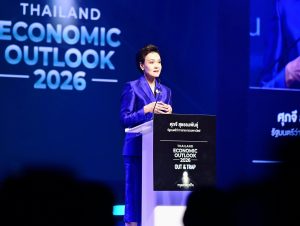Thailand expects to finalize its trade deal with the United States by the end of the year, the country’s commerce minister said yesterday, while issuing a warning about the uncertain trajectory of the Thai economy.
On July 31, the Trump administration announced a 19 percent import tariff on Thailand, but it also warned that any goods deemed to be transshipped from other nations (i.e., China) will be hit with a harsher 40 percent tariff.
Speaking at an economic forum in Bangkok, Reuters reported that Suphajee Suthumpun said that the two nations were in the process of finalizing rules of origin and regional value content that would determine which tariff applies. In her address, Suphajee described the U.S. as a “crucial trading partner, accounting for approximately 1.9 trillion baht [$58 billion] in exports.”
Suphajee, the former CEO of the Dusit Thani hotel conglomerate, who took up the post of commerce minister when Prime Minister Anutin Charnvirakul took office last month, said that negotiations on free trade agreements with the European Union and South Korea are also expected to be completed by the end of the year or early in 2026.
The U.S. tariffs have come at an unfortunate time for the Thai economy, which has struggled to recover from the recession of the COVID-19 pandemic. In its most recent regional economic update, released this week, the World Bank projected that Thailand’s economy would grow by just 2 percent this year, and 1.6 percent in 2026. This compares with a growth of 4.1 percent in 2018.
So far, the tariffs have had a negative impact on Thai exports, with factory output falling by 4.19 percent in August.
“The growth of our country has been continuously slowing down,” Suphajee told yesterday’s conference, as per The Nation. “If we don’t do anything, we will surely be stuck in the loop because this year we probably won’t exceed 2 percent.” She cited Thai government estimates of between 1.8 and 2.3 percent economic growth this year.
In addition to the tariffs, Thailand’s economy is burdened with an ageing population, heavy levels of household debt, and a high-valued currency that is making life difficult for Thailand’s exporters. Suphajee warned that the lower Fed rates had prompted capital inflows that have pushed up the value of the baht, which has risen steadily since the start of 2025.
This has reduced Thailand’s competitiveness with regional rivals, including Vietnam, whose economy the World Bank projects to grow by 6.6 percent this year – despite the impact of U.S. tariffs. In August, the country’s Ministry of Tourism and Sport reported that foreign tourist arrivals had fallen by more than 7 percent so far this year.
Thailand is also being stalked by the spectre of deflation, having posted six consecutive months of negative inflation. Suphajee stressed that urgent demand stimulation measures are needed to reverse this trend and restore the public’s purchasing power. Late last month, Finance Minister Ekniti Nitithanprapas said that the economy “is heading towards a downward spiral and growth is nearing zero.”
So far, Anutin’s government has pledged a number of measures to address these economic challenges to the greatest extent possible prior to its planned dissolution of parliament early next year. In a policy statement to parliament, Anutin announced measures to reduce living costs, tackle household debt, and stimulate domestic tourism. Among these are a debt relief scheme 47 billion baht ($1.46 billion) co-payment scheme, in which the government will subsidize up to 60 percent of the costs of certain food and consumer goods for qualified Thai citizens and debt relief.
“With limited time and a budget not prepared by this government, as well as being a minority administration, the government must urgently address the challenges currently facing the nation,” he told parliament on September 29.
Yesterday, Ekniti announced that Thailand will spend 10 billion baht ($307 million) to buy bad household debt this month, in a bid to reduce its drag on the economy. As of June, Thailand’s household debt ratio sat at 86.8 percent of GDP, among the highest rates in Asia.




























